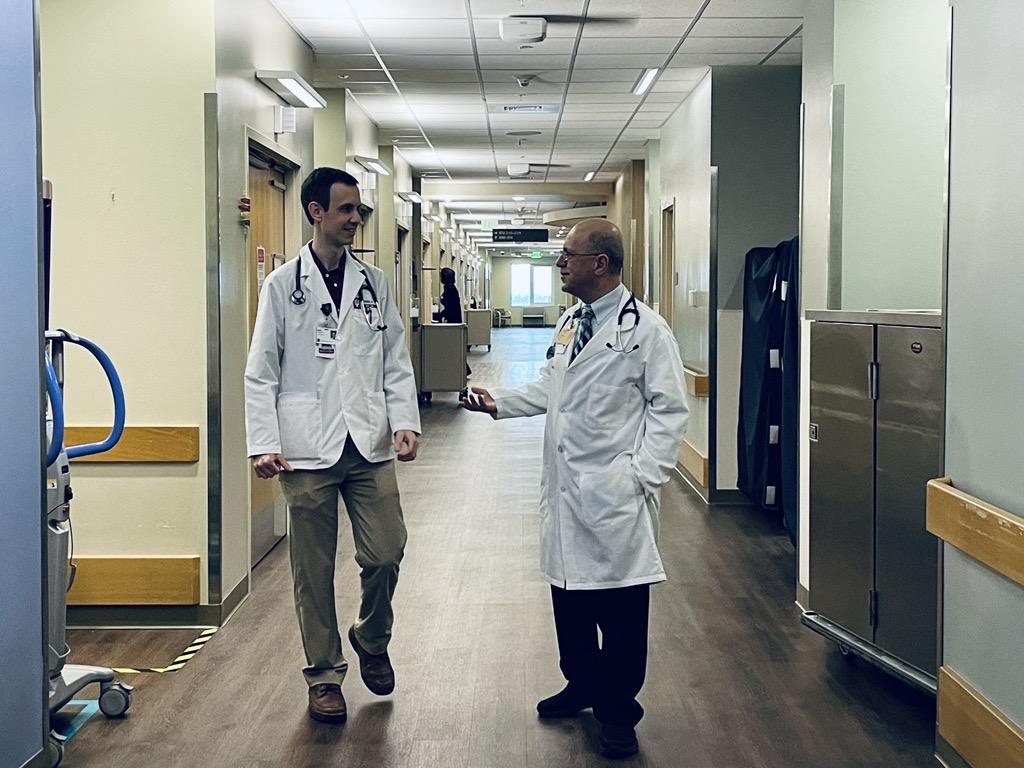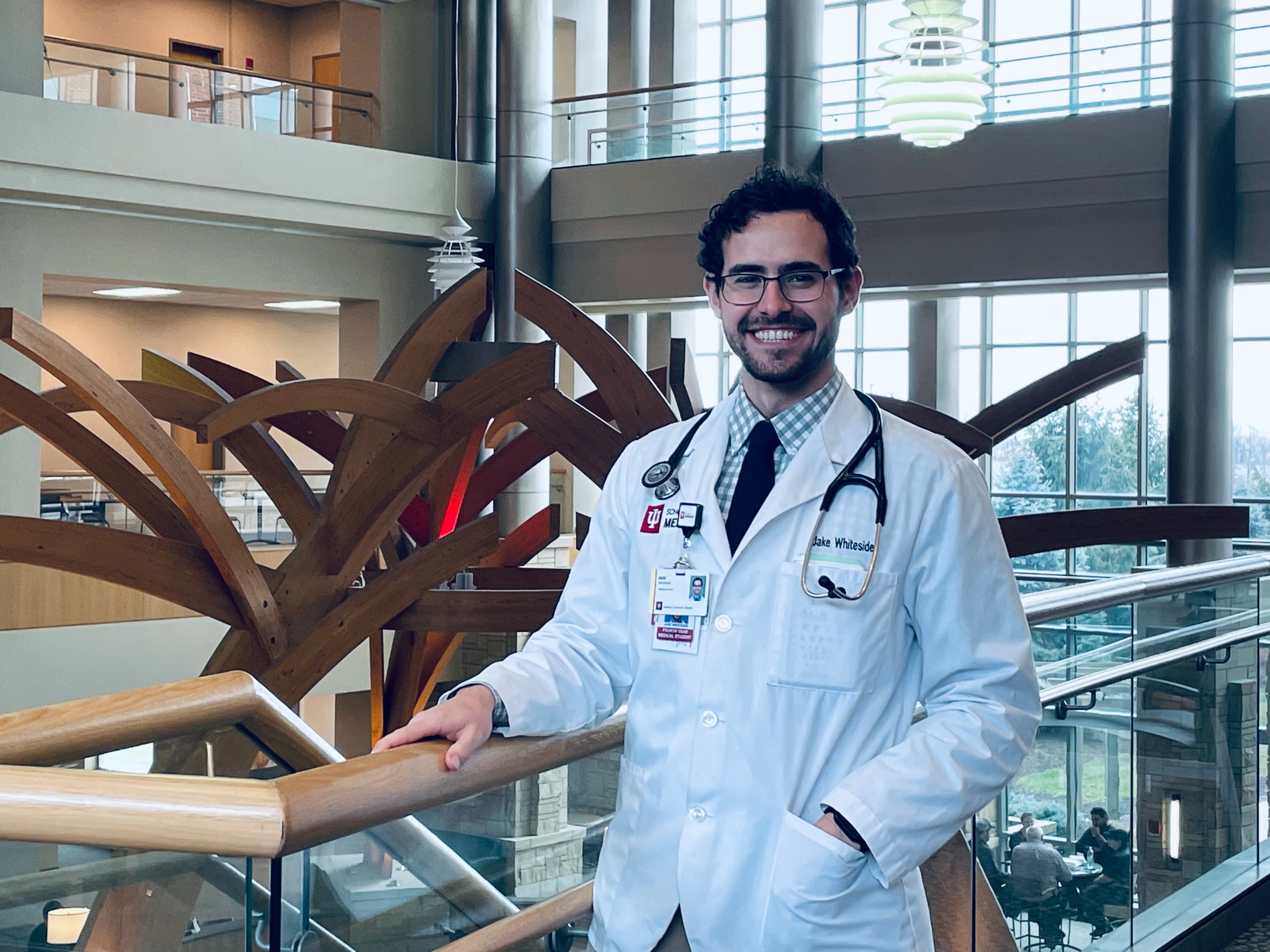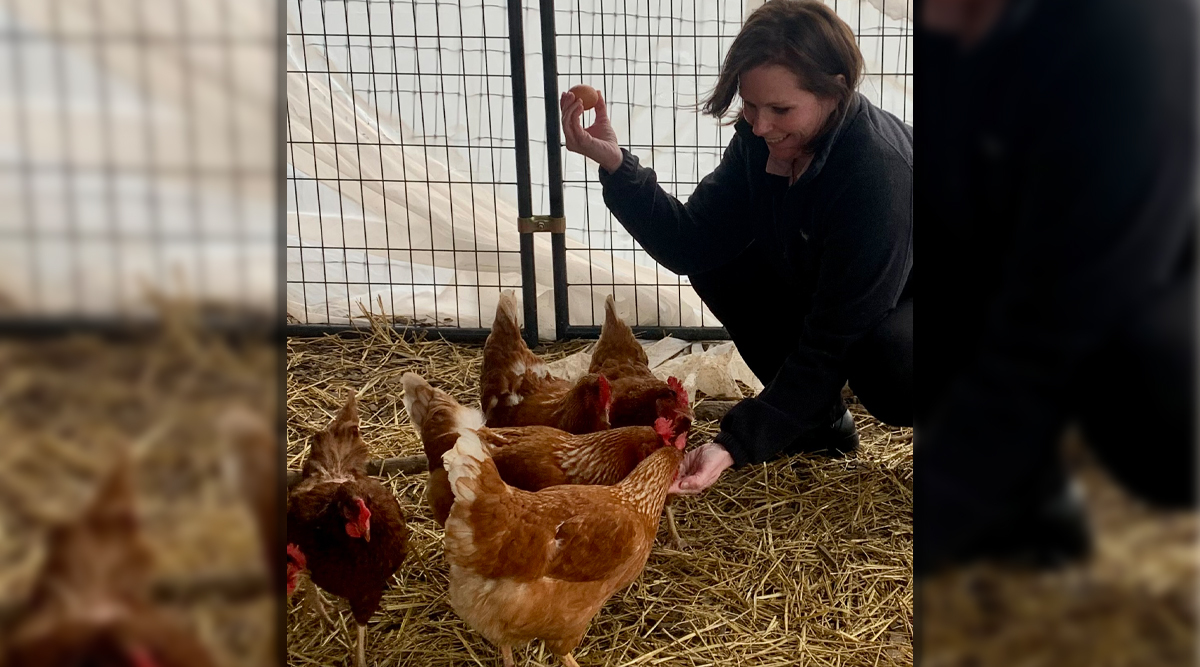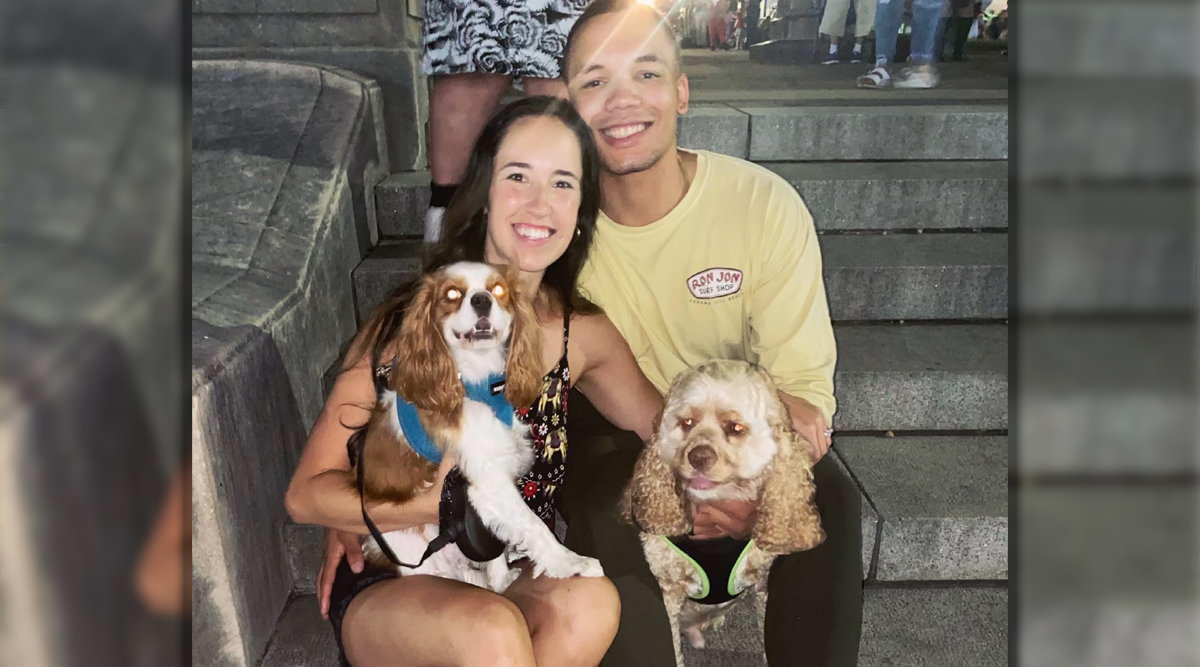Month: January 2023
Nurse spotlight: Libby Cox
Libby Cox has been a nurse on the transplant ICU at University Hospital for the last 3 ½ years until recently transitioning to a new role as a quality specialist with IU Health’s medical staff office. “It will be hard to leave bedside nursing. I will miss spending time with my patients and getting to make a difference in their lives, but I think ultimately, this new role will allow me to still do that, just without anyone directly knowing.”
Medical student creates song to help others learn stroke signs
Ari Williams is a fourth-year medical student who is working toward becoming a neurosurgeon. As part of a public health project he wrote a catchy song to help people learn the signs of a stroke. “I didn’t want it to have any sarcasm… I just wanted it to be really honest and fun. It’s only two verses and a couple choruses spread out so I tried to make it simple enough that people can remember.”
This ‘shining star’ is a social and spiritual safety net for the community
A neighborhood partnership is focused on creating a healthier Indiana.
By IU Health Senior Journalist, TJ Banes, tfender1@iuhealth.org
There are stories of loneliness and sadness and there are stories of friendship and hope. For more than two years now, IU Health has partnered with churches throughout Indianapolis and Southern Indiana to fulfill a need that extends beyond traditional medicine.
This week, members of those churches were recognized for their efforts in providing compassionate care.
The Congregational Care Network was initially formed as a response to those in the community who were cut off from their support systems due to COVID-19. From there, the initiative grew to include more than 20 congregations of various denominations.
The idea was to train parish volunteers who would reach out to IU patients when they returned home.
“One of the missions of IU Health is to create a healthier state and we can’t do that alone,” said Shadreck Kamwendo, Director of the Congregational Care Network. Last year, 392 neighbors were served by various congregations.
“Your selfless commitment to those neighbors is one of the highest virtues I can imagine. During a pandemic you have given hours of your selfless time to those in need,” said Dennis Murphy, CEO & President of IU Health. He added that early evidence shows neighbors involved in a support network have improved health. “We are determined to address the non-medical factors that impact overall health – including loneliness and the disparities it brings,” said Murphy, through a video address.
One volunteer, Stephanie Baker, a member of First Baptist North Indianapolis described her involvement as “joy that goes straight to your heart.”
She shared stories of a neighbor who was robbed of her last $20 while walking her dog, and another neighbor who was making a meal of beans and wieners to get by until pay day. She told of another special friend who needed a battery changed on a smoke detector, and another one who wanted to study the bible.
Suzie Baker, a volunteer with Second Presbyterian Church, talked about how the Congregational Care Network expands her church’s services. “We have a food bank and a lot of outreach programs and now we have IU Health bringing us individuals who are in isolation.” Many of these individuals do not attend a church so they might otherwise not connect with a parishioner.
The volunteers talked about various challenges that go beyond typical medical needs – transportation, food insecurity, violence, inadequate housing. Through regular one-on-one contact by phone or in person, they get a clearer picture of those specific needs.
“One of the questions clinicians ask our patients is, ‘what matters most to you today,’” said Dr. Leah Gunning Francis, Senior Vice President and Chief Missions & Values Officers of IU Health. “We want our patients to be seen and heard. In asking that question, it helps our clinicians get to the heart of their concerns beyond what is visible to the eye. It’s a way of helping them chart a pathway filled with hope,” said Francis. “I see the Congregational Health Network as connecting our neighbors with vital resources and showing them that someone cares for them. That makes the Congregational Care Network a shining star at IU Health.”
Teaching tomorrow’s physicians
There is a nationwide shortage of physicians. According to the Association of American Medical Colleges, the U.S. could see a shortage of 100,000 or more physicians by 2033. The severity of the problem varies from specialty to specialty. According to an article by Time Magazine, “Neurology and psychiatry, as well as pulmonary and critical care medicine are headed for larger shortfalls due to the complex, chronic conditions America’s aging population must manage.”
This is a concerning situation that could lead to poorer health outcomes for many patients. Rural communities tend to suffer more, as high educational debt tends to lead new graduates to seek higher paying positions in larger metropolitan areas.
One physician at IU Health Arnett has made it his mission to change the outcomes for Greater Lafayette and nearby communities by teaching the physicians of tomorrow—Akram Al-Makki, MD, FACP, FASN.
Al-Makki joined the IU Health Arnett nephrology department in 2004. Stephen Ash, MD, FACP and his life-long pursuit to make hemodialysis technology simpler and safer was a big factor in Al-Makki’s decision to move to the area. Ash was a physician he admired and wanted to learn from. Al-Makki also knew he wanted to become more involved in academics.
“When you take the oath, part of the mission should be sharing your knowledge with both students and patients,” shares Al-Makki.
The road to becoming a physician
It takes 10 – 14 years to become a physician. Physicians must complete a four-year undergraduate program, an additional four years of medical school, then three to seven years in a residency program to study the specialty they choose to pursue.
Since 1971, the Indiana University School of Medicine has offered medical education on the Purdue University campus in West Lafayette, Ind. Originally, medical students would spend the first two years of classes in West Lafayette then transfer to finish their third and fourth years of medical school in Indianapolis.
Shadowing opportunities in Greater Lafayette were sparse, but that needed to change, according to Al-Makki. The Graduate Medical Education (GME) program for medical students was established at Arnett Hospital in 2009 and Al-Makki volunteered to serve as the Internal Medicine and Nephrology Education Site Clerkship Director. In 2012, he was appointed Director of the program—an appointment that was based on his advocacy for research, having a passion for education and believing in the importance of constantly learning.

“I formulated vision and mission statements that I used as a guide and inspiration to strongly encourage my fellow physicians to volunteer to teach medical students,” shares Al-Makki. “Policies, procedures and orientations were developed. I helped advance the program and expand the number of physicians involved in medical education and students rotating at IU Health Arnett.”
Growing physician involvement
Within two years, the number of physicians involved increased from around 40 to more than 120. Today, more than 140 IU Health Arnett physicians are involved with medical student education.
In line with Al-Makki’s vision, the IU School of Medicine added a third year of medical education to their West Lafayette regional campus at Purdue in 2012 and a fourth year in 2013. Led by medical education and research experts, the IU School of Medicine in West Lafayette follows the school’s statewide core MD curriculum. Like all IU School of Medicine statewide locations, the West Lafayette campus offers community participation opportunities and exceptional clinical education through student groups, medical service-learning programs and other extracurricular activities, and a strong partnership with local clinical providers to ensure students get authentic experience in applying basic science concepts to real patient cases.
Keeping medical students in our community
Now students at the IU School of Medicine in West Lafayette can complete all four years of their medical education in Greater Lafayette. Two graduates from the first class to remain in Greater Lafayette all four years joined local medical practices in our community after finishing their post-graduation residency training. Many others who have graduated since 2014 have also returned to serve our community after finishing their residency training.
“Teaching is my passion,” shares Al-Makki. “The best way to learn is to teach. The students enrich my experience and that of the patient. They add a lot to what we do every day, help us stay up to date on technology and they ask questions—which stimulates the brain.”
Jake Whiteside is one of the medical students from the IU School of Medicine-West Lafayette campus completing his four years of medical education in the Greater Lafayette area. West Lafayette was a draw because his best friend lives locally. Being a husband and father of three young children, he also did not want to move his family for clinical rotations in his third and fourth years of medical school.

“Being here, I knew I would have a lot more one-on-one education,” shares Whiteside. “I appreciate being involved with the patients and being able to ask questions. I also ask my mentors to challenge me.”
How do the patients react to the medical students?
“The patients receive more attention,” adds Al-Makki. “The addition of the medical students provides a good discussion of the issue and possible solutions which helps the patients. I also ask the students to review the patient history with me and the patient.”
Whiteside shares that learning at Arnett and in the Lafayette area has been a good fit for him and his family.
“My physician mentors and the team at IU Health Arnett have been friendly, approachable and flexible—always willing to work around anything I need in my professional and personal life,” shares Whiteside. “I really feel that we are all in this together.”
Whiteside has found his passion in general surgery—his past experiences in general and bariatric surgery research contributed to his excitement to learn more about general surgery and its subspecialties, including hand surgery, bariatric surgery and robotic surgery, among others. Whiteside has matched into an active-duty surgical residency program at Wright Patterson Air Force Base/Wright State University and will begin his surgical training there in summer 2023.
Will he return to Indiana? He hopes so.
“It is a great place to live and work,” adds Whiteside. “The Midwest offers a lot of flexibility.”
Al-Makki expanded locally a statewide summer educational program called Hospital Medicine Education (HME) and secured funding to provide a grant to a female and a male student moving from their first year into second year. The eight-week program allows the students to rotate through various departments at Arnett, in hopes that the students will be interested in remaining in our community. The HME program has become very popular with the medical students.
Al-Makki is continuously working to improve health care at Arnett by advancing the quality of medical students and physicians’ education through collaboration with the IU School of Medicine and its curriculum priorities. His work in raising the engagement of medical education has resulted in a higher level of professional satisfaction of physicians through mentoring and teaching students.
“I take pride in what we have accomplished,” shares Al-Makki.
Eggs prices gone up? Guess how much one egg cost this infusion nurse
As we watch the price of eggs go up, up, up, this infusion nurse tells how her chicken raising adventure is paying off.
By IU Health Senior Journalist, TJ Banes, tfender1@iuhealth.org
We’ve all heard of the fairy tale about the goose who laid the “golden egg.” But how many have heard about the nurse who hatched a project influenced by one of the fledglings from her own nest?
It was in fact, Amanda Tames’ youngest son, who decided raising chicks would be a great FFA project. Tames approached the idea skeptically – raising chickens, was not her first job.

Nursing became a second career for Tames when she obtained her degree in 2018. For years before that, she worked for a CPR training site. “My mom was a nurse and I’ve always been around the medical field but I think I resisted nursing for so long and then knew it was what I really wanted to do,” said Tames. She joined IU Health five years ago. While completing her nursing degree she worked as a patient care assistant at Riley Hospital for Children and then worked as a nurse at Riley. For the past several years, she has worked with IU Health’s Specialty Infusion Team.
Today, as hospitals across the country celebrate “National IV Nurse Day” Tames shares her role. At the end of 2022 she became a unit supervisor. She also shares how she said, “yes” to her son and added a few extra chicks to her brood.
Members of the IU Health Specialty Infusion Team are responsible for administering at- home medications for a variety of conditions. Some of those include Crohn’s disease, ulcerative colitis, and neurological disorders. Tames can see anywhere from two to five patients a day depending on the amount of time needed per an infusion treatment. The home visits also include charting and monitoring patients.
“I have a lot of repeat patients so I really get to know them,” said Tames. Married to her high school sweetheart, Tames and her husband live on two acres in Clayton, Ind. They are the parents to four children.
It was her youngest who decided raising chickens would be a good project last spring.
“I said we’d start with six. We went to Tractor Supply and ended up with a dozen. Then someone posted on a Facebook group that they had a rooster that needed rescued so we ended up with 12 hens and rooster,” said Tames. “I had no idea what I was doing.”
Lucky for her, another infusion team member, Wayne Moore, had been raising chickens for some time. She was a preceptor for him when he joined the infusion team and he coached her through raising chickens. Moore has been a nurse for 12 years and started at IU Health in May 2022. He’s been raising chickens for almost three years.
“I got the itch to do it when I had a client raising chickens and they let me try a few eggs. I really enjoyed them,” he said. He and his wife average about five eggs a day.
“I ask Wayne all kinds of questions like how much room do I need? How do I keep the water from freezing? Is this normal? Is that normal?,” said Tames. “I’m always picking his brain – like how do we protect them from hawks? So many things I have no idea about.”
After purchasing 11 hens, building materials, fencing and miscellaneous supplies, she estimates her first egg cost about $1,000. That first egg was small but as the hens have continued laying throughout the winter, the eggs have gotten larger. And with the price of grocery store eggs going up, Tames has happily shares her crop with friends.
And how does her son fit into the project? “He’s in charge of cleaning the area and putting down fresh straw,” said Tames. And there’s something else he’s working on. “He wants me to get a couple of goats.”
Transplant manager advocates for esteemed program
She started her nursing career five years ago and quickly progressed to fulfill a new role at IU Health.
By IU Health Senior Journalist, TJ Banes, tfender1@iuhealth.org
She traces her interest back to high school. At Avon High School Kailyn Jackson became involved in a program called, “Project Lead the Way,” and began thinking about a career in nursing.
Project Lead the Way is a non-profit program that provides learning experiences geared toward science, technology, engineering, and math. It was the science part that caught Jackson’s attention.
The daughter of Danny and Laura Hutson, of Avon earned a spot on the Indiana State University (ISU) track and field team where she participated in high jump and javelin. After earning her nursing degree in 2018, Jackson joined IU Health working in transplant ICU.
In one of her first management roles, she oversaw the continuous renal replacement therapy in the operating room. “Some very sick patients require continuous dialysis and I watched the circulators and staff as they worked with those patients,” said Jackson. With ambitions of working in the operating room, she joined the transplant team in 2020, and worked at an outpatient surgery center for IU Health.
In her most recent role, Jackson was named transplant program manager in August 2022, working specifically with kidney, liver, intestinal and pancreas transplant patients.
“I think I saw this as an opportunity to help the transplant team. The OR was struggling with staffing so this gives me a chance to recruit and retain in my own way,” said Jackson.
“I think having a sounding board for the nurses makes them more comfortable and confident coming to transplant OR,” said Jackson. They relate to her on many levels. For one, she’s returning to familiar territory – her alma mater – to talk to fellow ISU Sycamore nursing students about career options.
“I start by telling them what OR nursing is like and then talk to them specifically about transplant. I feel like this position gives me some freedom to introduce some specifics that may not be readily available to first-time nurses,” said Jackson. “I talk about the many cases we do at IU Health and how the cases we do are not common. IU Health is the only place in Indiana to perform liver transplants and we are unique in offering multi-visceral transplants,” said Jackson. At some point, she hopes to take future nurses on rounds with physicians.
According to Donate Life Indiana, more than 100,000 men, women and children nationally are waiting at any given moment for a lifesaving organ transplant. More than 1,000 of those waiting are Hoosiers. Last year 4.2 million Hoosiers signed up to be organ donors; 276 organ donors saved the lives of others needing lifesaving transplants, 949 lifesaving organs were transplanted to recipients.
At IU Health many recipients receive kidney and liver transplants from living donors. Last year, IU Health performed 237 adult and pediatric transplants; 22 pancreas transplants; 160 liver transplants, and 10 intestinal transplants. IU Health ranked among the top 10 transplant programs in the nation for all organ transplants; total pancreas; and intestinal transplants.
IU Health’s Transplant program is not only nationally known by the number of patients served, but also by the team members in the program. Patients come from across the country and even outside the United States. In addition to qualified nurses, and managers, like Jackson, the team includes surgeons, physicians, social workers, transplant coordinators, financial navigators, procurement specialists, and other staff members dedicated to excellent clinical care.

Jackson is married to Jordan Jackson, who works in a management role for Amazon. “We have very different styles but I’ve learned a lot from him,” she said.
“Transplant is so special to me. Patients automatically feel gratitude and each transplant case is different. In OR we see so much behind-the-scenes and how we truly make a difference in the lives of others.”
Orthopedic surgeon specializing in upper extremities joins IU Health Ball team
Dr. Jacob Triplet is an orthopedic surgeon who has just joined the team at IU health ball Memorial Hospital. Dr. Triplet is originally from Buffalo, New York, and comes from a long line of medical professionals. “My mom was a nurse practitioner and three out of the five of us kids are physicians. My brother is an anesthesiologist, my sister is a pediatric intensivist and… I went down the orthopedic route and am very happy I did.”
COVID-19 diagnosis led to patient’s lung transplant: I just want to breathe
Troubling tingles
Katherine Penny had just completed a roundoff and was moving into a stunt with her fellow Indiana University cheerleaders when she noticed a tingling sensation running down her body.
She didn’t know it at the time, but a herniated disk in her neck was putting pressure on her spinal cord. And when the pain wouldn’t go away, Katherine turned to IU Health Southern Indiana Physicians neurosurgeon Bryan Wohlfeld, MD, for help.
Watch the video above to learn more.
